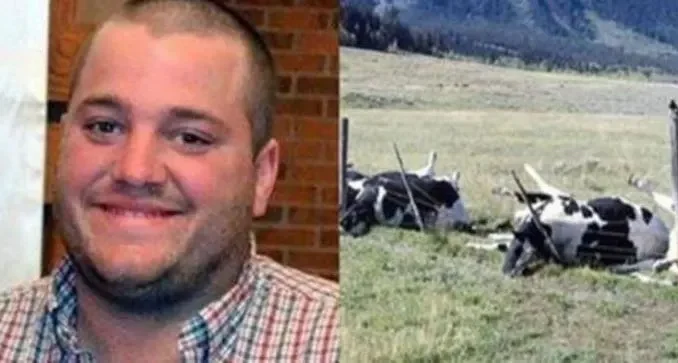A tragic incident on a Wisconsin farm resulted in the deaths of 29-year-old farmer Michael Biadasz and 16 cattle due to gas poisoning. The accident occurred when unusual weather conditions caused a “deadly dome of air” to form in a manure holding tank, trapping toxic gases. Michael’s father, Bob Biadasz, noted that despite having safely emptied the tank before, this rare combination of factors proved fatal.
To honor Michael’s memory, the Biadasz family lined up tractors and machinery along the farm road. The tragedy has sparked discussions on the need for stricter regulations regarding manure holding tanks to prevent similar incidents. The National Agriculture Safety Database highlights the importance of proper ventilation and warning signs for livestock areas, urging safety precautions for workers and animals. This incident underscores the dangers farmers face and the critical need for preventive measures.
The tragedy also serves as a grim reminder of the unpredictable risks associated with farming. While farming is often romanticized as a peaceful and fulfilling way of life, incidents like this show the very real dangers farmers face on a daily basis. Working in and around hazardous environments, such as manure tanks, requires heightened vigilance and a deep understanding of environmental conditions.
The formation of a “deadly dome of air” in the tank, as described by Bob Biadasz, illustrates just how dangerous seemingly routine tasks can be. These conditions, caused by a specific set of factors including weather, can easily go unnoticed by those without the proper knowledge or equipment to detect them. Such an event can result in tragedy within moments, making the need for preventive safety measures even more urgent.
Following the incident, local authorities and safety experts have called for a reevaluation of farm safety protocols, particularly in relation to manure management. Experts emphasize that farmers should be trained in identifying potentially dangerous weather patterns and atmospheric conditions that could lead to gas build-up. Furthermore, updated technology and equipment could help better monitor these risks and offer early warnings before conditions become hazardous.
The Biadasz family’s efforts to honor Michael’s memory with a public tribute highlight the deep emotional impact such events have on farming communities. In rural areas, farms are often not just places of work, but family legacies passed down through generations. The loss of a young life, especially in a profession where safety measures are sometimes overlooked or underdeveloped, can devastate entire communities.
This incident has also led to increased support for policies aimed at improving farm safety. Advocates are pushing for more comprehensive safety regulations, particularly those that address the specific risks related to manure pits and confined spaces. These policies would aim to safeguard not just farmers like Michael, but also farm workers and animals who are often in close proximity to hazardous environments.
Additionally, there has been a renewed focus on improving communication between farmers, local governments, and safety organizations. By fostering a collaborative approach to farm safety, it is hoped that accidents like this can be minimized. Clearer guidelines, better training, and more accessible resources are seen as crucial steps to preventing similar tragedies from occurring in the future.
The emotional toll on the Biadasz family is immeasurable, and their perseverance in advocating for change demonstrates their strength and commitment to ensuring that Michael’s death was not in vain. This incident has sparked conversations not just about farm safety, but about the need to recognize and support the hard work and sacrifices made by farmers, who often work in dangerous conditions for long hours.
